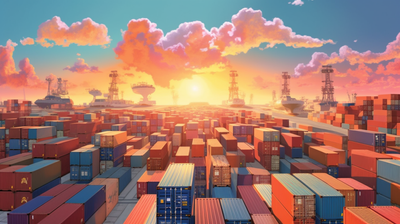The economic community seems reticent to embrace population dynamics as a significant determinant of relative economic health. I've posted a video from Peter Zeihan talking about just that point below; there is no surprise that his go-to is always demographics. Criticism of the centrality of demographics doesn't sufficiently consider things like tipping points, energy, et cetera.
However, if you pay attention to the geopoliticians (like Peter), he is very skilled at articulating a description of economics that is agnostic to the school of thought that post-Keynesian, neo-Classical and Libertarians alike seem to be arguing over. Mine is better, mine is better, oh ya, mine is better.
I am so tired of the production-centric conversation when GDP is nothing but a red herring.
GDP as a Red Herring:
If a drastic reduction in production causes an economic collapse, GDP is a red herring if it distracts from the underlying issues. For example:
- If GDP remains relatively stable or grows due to factors unrelated to production, such as increased government spending or consumption financed by debt, it might mask underlying production problems.
- If economic policies or discussions focus solely on GDP growth without considering its sustainability and nature, important aspects like production capacity, supply chain integrity, and sectoral balance might be overlooked.
- GDP does not account for the distribution of income or wealth, environmental degradation, or the depletion of natural resources, all of which can be related to production issues and contribute to economic instability or decline.
- Economic policies that reward (and incentivize) production over order negate the rule of law and the constitutions supporting freedom of movement, association, and expression.
Are you tired of discussing what school of thought should dominate the discipline (Art) of economics as we collectively hurl ourselves toward a cliff of social and economic collapse? Production and the population supporting nations worldwide are essential to establishing the baseline of what is happening. From there, what should be done is more of a function best executed by nation-states because the constitutions that undergird the legislative bodies worldwide will never surrender their citizenship in favour of a world government. In my opinion, Keen, Radzicki, Keynes, et alia are proposing a new science of sorts with the idea of transforming economics into a science, similar to engineering vis-à-vis System Dynamics (SD).
Social engineering is a slippery slope that must be avoided, especially if the levers become obvious through (SD) models, and eventually a means for policymakers to manipulate the population with a discipline only SD engineers can understand. To my economic friends, I realize I am not describing their academic contributions in a favourable light. However, despite the best intentions, the ineptness of politicians everywhere demonstrates one thing categorically, politicians can not be trusted, and so giving them a more robust, scientific economic "system" will do nothing but initiate an already obscure field of smoke and mirrors into a field of study that is somewhat predictive in nature.
I should back up a bit. Modelling complexity has its place and is a clear winner in demonstrating a coherent understanding of the complexity and how populations can participate in power law distributions, exponential growth, feedback loops, and complex derivatives. I am trying to point out that the adoption rate for such a paradigm has to compete with a system of global governance that is unattainable, utopian and quite frankly unattainable (let alone unsustainable).
Careful for what you wish for is all I am saying. Meanwhile, Europe is preparing for war, Pierre Pollieve is going to demolish the Liberal government in Canada by calling an early election to eliminate the carbon tax, capitalism is arguably in a precarious position in the US (Trump's elimination at all costs), I could go on and on and on.
My Suggestion:
If it were up to me, I would push the US to increase their current $34.54 T debit to $100T+ and tax the rest of the world's nations for the stability of global order. Fuck the WEF and their utopian propaganda, punctuated by power-grapping elite positions of power. Additional naval cruisers will be built to patrol and stabilize world trade. Does this mean that America will continue to be the most privileged country on the planet? Yep. Is it fair? Nope? This is a global order that I can get behind because I DO NOT want to live in a world where the US has fallen, is weak, or surrenders the greatest nation on the planet to the likes of Klaus Schwab, Putin, Naimi Klein, or some perverse understanding of a Muslim paradigm of Arab states. If countries are unwilling to participate, then too bad; it's time for the benevolent dictator (otherwise know as US) to stand up, grab Wall Street's bull by the horns, and show some leadership.
American citizens can then "Hellenize" the rest of the nations worldwide, maintaining order and stability, all for the Good (καλός) of life, liberty and the persuite of happiness. Global sustainability is like a perpetual motion machine —FICTION.
The sooner we realize this, the greater good for the greatest number will be made real. Sorry folks, the God of war is back; we can either bow down to the prowess of economic supremacy or suffer the consequences of pluralism.
Homework:
Watch the following video from Peter Zeihan (if you haven't already); https://youtu.be/6BNRZdqkZjg?si=Hiiiq8VVoRGyB2yc
Watch the following 10-minute Ted talk; https://www.youtube.com/watch?v=PImDVT8fb-I
Pick three (3) countries and investigate their relative overshoot on the following website;

Our demography is our destiny. Freedom takes courage and a strong military.







